On a brisk, sunny Saturday in early March, a group of women dressed in full hockey gear and carrying industrial size brooms descend upon the frozen tennis courts of the German embassy. The tennis courts—which have been flooded to make a thick layer of ice—have become dusted overnight with a light layer of snow, which the broom-bearing women hurriedly sweep to the sides of the tennis courts.
“I don’t think this is accomplishing anything,” one woman yells, her voice muffled behind the cage of her helmet.
“It is!” another yells back. “You would not believe what this is accomplishing.”
For a casual onlooker, the sight of women in hockey gear sweeping icy tennis courts in the middle of Moscow winter might seem unusual. But for the members of Moscow’s Broomball League, this is a necessary task preceding any broomball game. And Saturday, March 2, is not just any ordinary broomball game: it is the finals of the 2018-2019 Broomball Season, a much-anticipated event among Moscow’s expat community that decides which team will be awarded the coveted samovar that serves as the broomball league’s first place trophy.
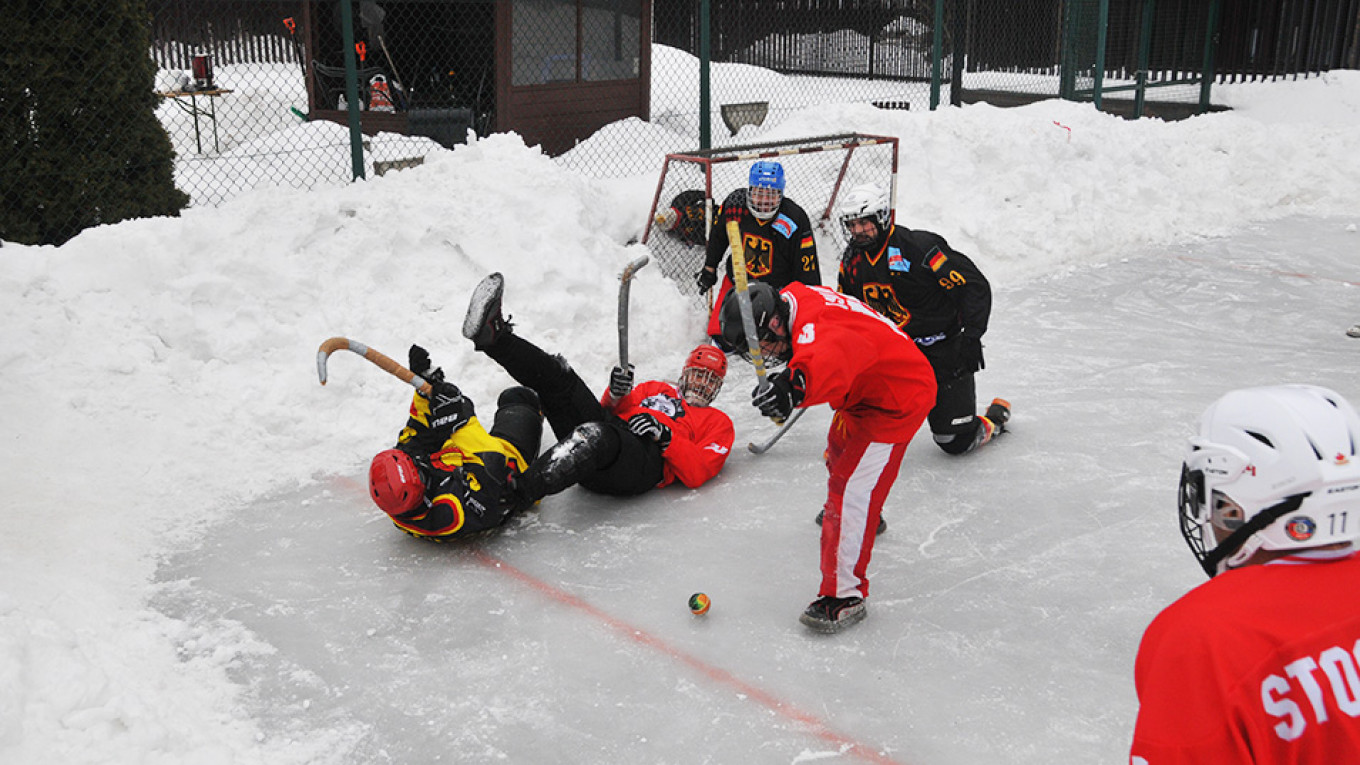
The women finish sweeping the ice. They trade their brooms for their broomball sticks. They do a few warm up exercises and form a huddle. It is 11:30 a.m. In mere moments, the final match—between the Canadian Chicks with Sticks and the German Eishexen— will begin. At 1:30 p.m., the Finn Lions and the mixed team the Pazhalstasticks will battle it out for the male title.
But what is broomball, and why is it is so popular among Moscow’s expat community?
Broomball is a winter sport with rules similar to hockey but instead of skates, players wear special rubber shoes, and instead of a puck, players chase after a small plastic ball.
“It’s a mad game,” David Breese, the Moscow Broomball league president, told The Moscow Times. “You’re trying to run around at a hundred miles per hour in rubber shoes on ice. It’s very competitive, very silly.”
From Vikings to diplomats
The history of broomball itself is shrouded in mystery. It is widely believed that the game originated in the early 1900s in Canada among street car workers, who played with small soccer balls and corn brooms. Others believe that broomball can be traced even farther back to 10th century Scandinavia, where Vikings played a similar—but markedly more violent—game called “Knattleikr” that often resulted, according to legend, in death.
The game appeared in the U.S. state of Minnesota in the 1930s but did not become popular until the 1960s—around the same time that broomball began to gain popularity in Moscow.
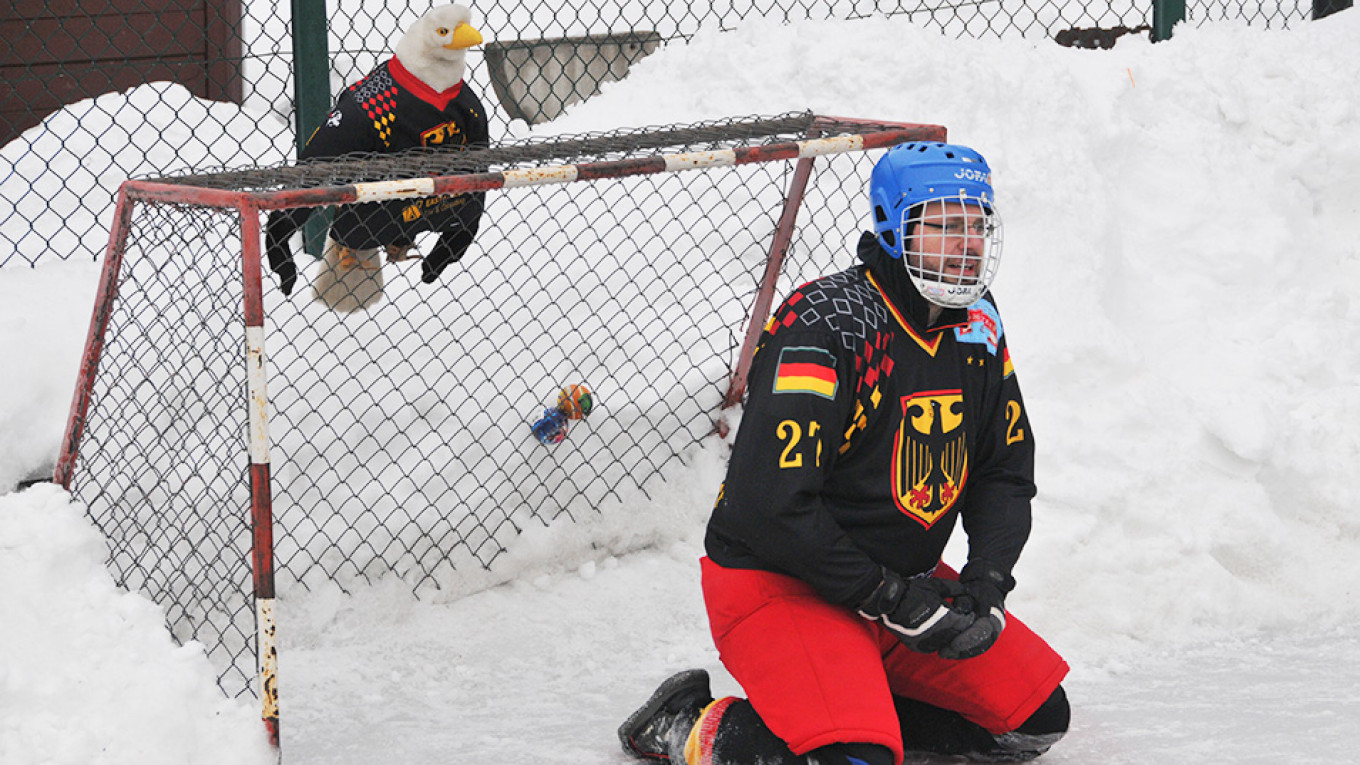
If the general history of broomball is shrouded in mystery, then the history of broomball in Moscow is a riddle wrapped in a mystery inside an enigma. Nobody is certain who is responsible for the rise of broomball in Moscow, but league historian Andrew Mullen told the Moscow Times that allegedly an ex-NHL player brought the sport to Moscow in the mid-1960s, and the game quickly gained popularity.
But because this was before the age of the internet, and records were kept on sheets of paper, and because the game was played between embassies—whose staff generally changes every two years— it’s hard to be certain.
The Moscow league
Unlike the version played by teams associated with the International Federation of Broomball Associations (IFBA), the Moscow version developed its own set of rules and regulations. The biggest difference is in the equipment: in traditional broomball, players use a broomball stick comprised of an aluminum or wooden shaft and a rubber head. But in 1960s Soviet Moscow there was no formal equipment available, and so players molded pseudo-hockey sticks out of tape, string, and hand-made Russian brooms called veniki, a tradition that remains to this day.
In the game’s earliest iteration, only embassies were allowed to form teams. Games mostly took place at the British Embassy, the Swedish Embassy, and the German Embassy, and broomball quickly became a popular way for ex-pats to connect with each other and get outside during the long, dark Moscow winter.
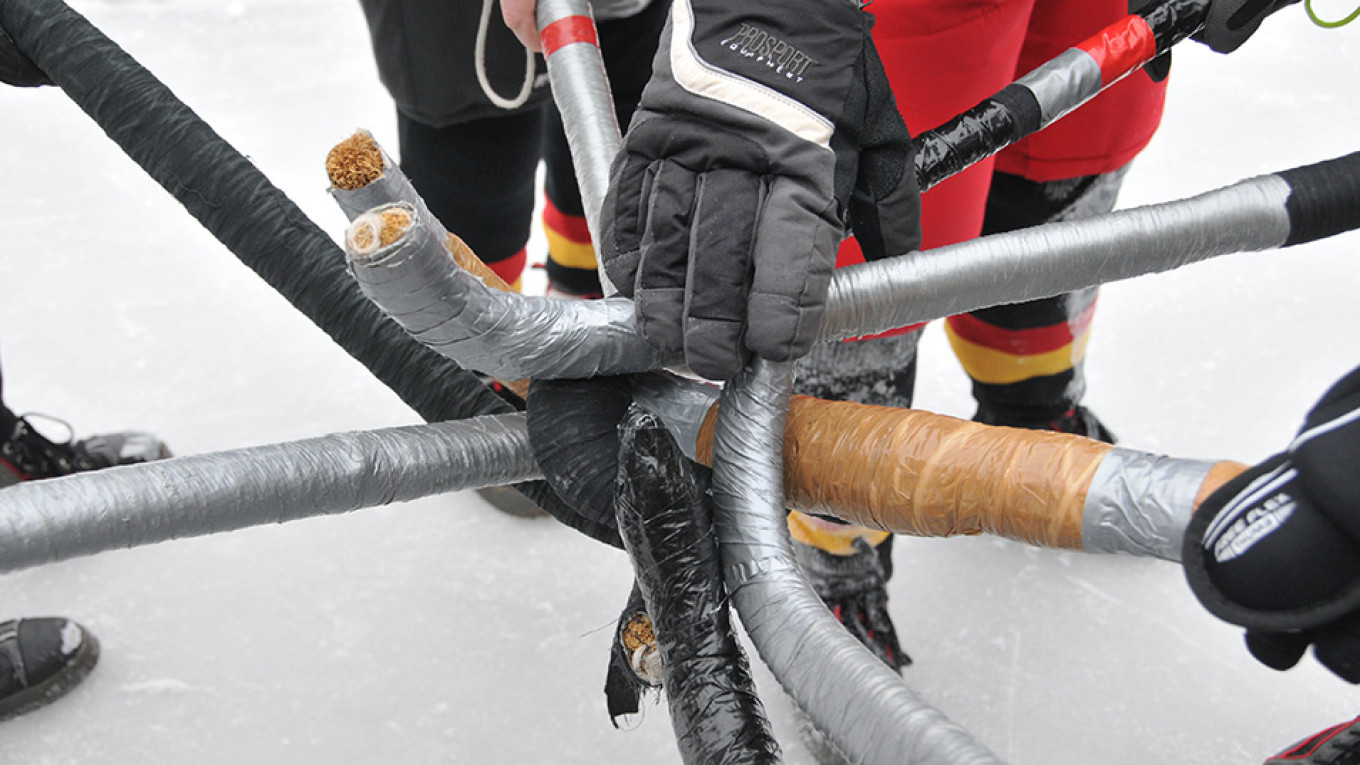
“There are stories,” David Breese told the Moscow Times, “that during the Soviet Union hundreds of people came to watch the games.”
During its heyday, there were as many as thirteen men’s teams and nine women’s team. Now—largely because of sanctions and the political climate—many foreigners have left Moscow, and this has affected the broomball league’s size.
But despite the shrinking expat community, this year’s broomball league remains a fierce and proud one, with seven male teams and four female teams participating in the 2018-2019 broomball season. To compensate for the smaller number of expats in Moscow, teams are now no longer strictly connected to embassies and tend to have members from multiple countries.
And the winner is...
This is the case for both of the teams facing off in the women’s final, where the atmosphere is downright jovial. The German team, in black jerseys decorated with orange and yellow flames, cheer on their teammates from the sidelines.
“You can do it! You’re super!” they cry, as the Canadian goalie throws the ball across the court. Rita Feldmann—a German broomball veteran who’s been playing since 1996—dives in front of the ball and comes crashing down onto the ice. She stands up, and within seconds is once again sprinting across the ice.
“That’s the most challenging part,” says Mona Krems, who formerly played for the Eishexen, as she watches her teammates advance towards the goal. “When you fall, you have to stand up quickly. You have to be quick and fit.”
Of course, diving across the ice often has its consequences: many players suffer from broomball-related injuries. Legs, ankles, and knees are commonly bruised or broken, and concussions are not unheard of. This year, U.S. defender Thuy Duong Thi Lawrence tore a tendon and muscle in her shoulder on the broomball court, but was, regardless, in exceedingly high spirits as she cheered on her teammates at Wednesday night’s semi-finals.
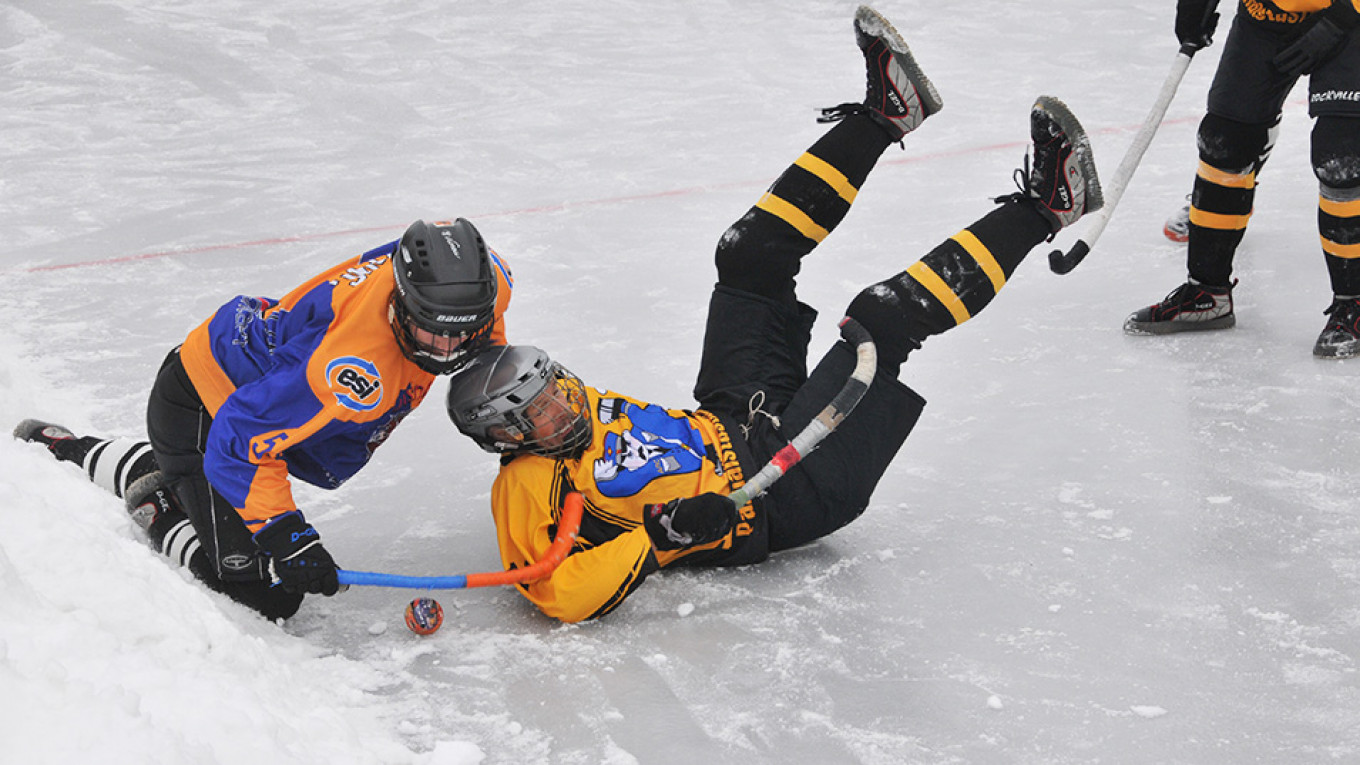
By 1:30 p.m., the men are out on the ice. The Finn Lions—formidable in their white and blue jerseys—are known for their serious approach to broomball, with players notoriously flying out from Finland to play in the finals. Their opponents, the Pazhalstasticks, are a multi-national team of American, Dutch, French, and Swedish players, who don bright yellow jerseys and run warm-up drills before the game.
According to Andrew Mullen, watching the action from the sidelines, the teams are well-matched. It’s anybody’s game, and both are hungry for the gold.
The atmosphere at the men’s game is a little more sinister—almost immediately, tensions between the Finns and the Pazhalsasticks are running high.
“Buddy, you were holding my stick!” yells an angry Pazhalstastick as he speeds past one of the Finns. At some point, a small brawl erupts near the Finnish goal. In a particularly heated moment, a member of the Finnish team kicks a member of the Pazhalstasticks, resulting in both of them getting temporarily pulled from game.
In the end, the Finn Lions win with a score of 3-1. For the women, the Chicks with Sticks take the game with a score of 2-0.
Black-tie broomball
That night, whatever tensions might have existed during the game itself vanish at the legendary Broomball Ball, a black-tie affair held at the German Embassy. Earlier in the post-Soviet era, the Broomball Ball used to take place at some of Moscow’s finest hotels. Alongside the Melbourne Cup Ball, it was one of the two biggest expat events of the year, with as many as 400 guests in attendance. According to members of men’s teams It Disney Matters and Finn Lions, broomball parties—as well as broomball games themselves— used to be a little bit rowdier in the 1980s and 1990s, but they declined to comment on any specific incidences, only sharing that though they never officially got kicked out of any venues, hotels did sometimes say “they’d prefer not to have us back.”
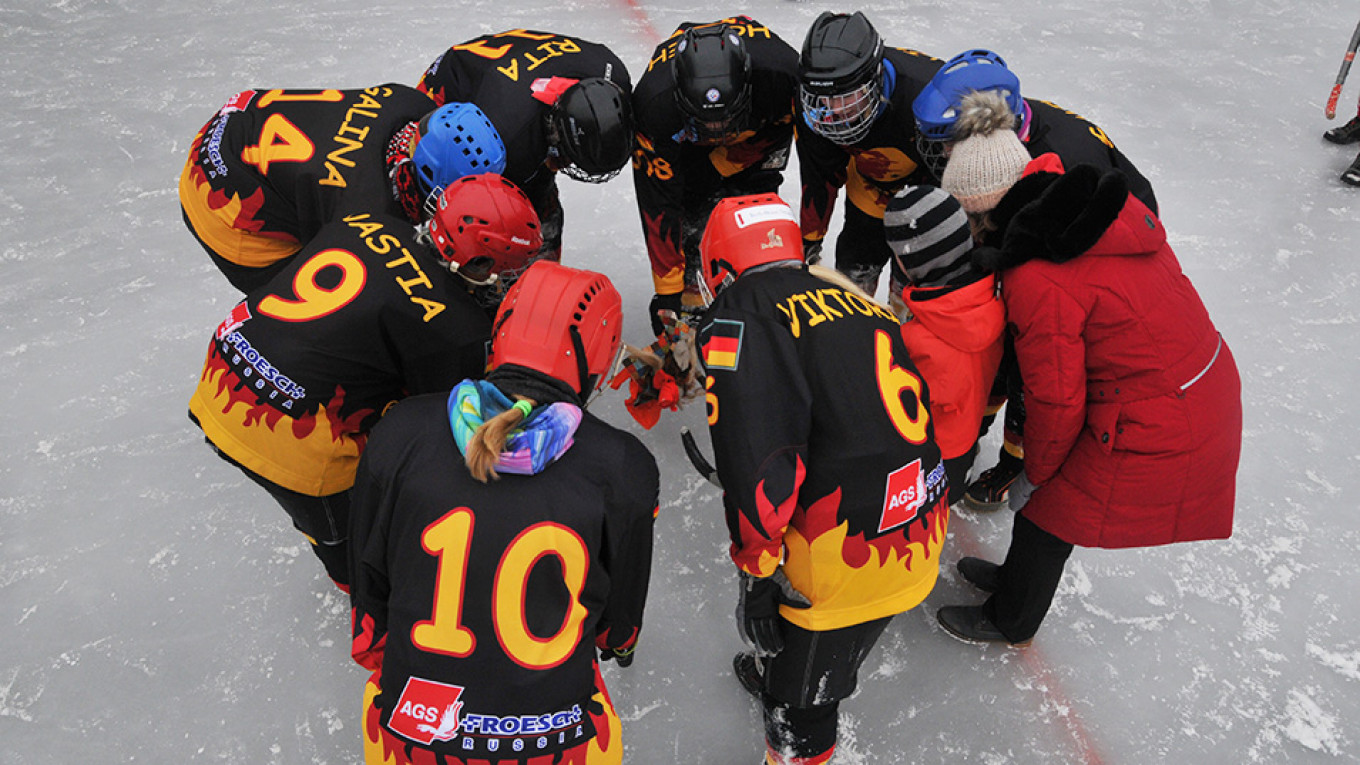
This year’s theme is “Carnivale,” and the players are largely unrecognizable behind elaborate masks, face paint, and wigs. With a German DJ, flashing neon lights, orange-and-white balloons and a full bar and buffet, the Broomball Ball is as celebratory as a wedding. The players accept awards, win prizes in the raffle, and later take over the dance floor.
It is clear why the tradition of broomball in Moscow has endured: aside from the opportunity to get outside in winter, engage in a sport that is both physically challenging and just plain fun, broomball provides a social circle for expats that keeps players coming back year after year.
Watching the final, Mona Krems, who hadn’t played for the Eishexen in two years, considered coming out of retirement.
“It’s worth it,” she said, as the Eishexen chased the ball. “I’m pretty decided that I’ll come back next year.”
A Message from The Moscow Times:
Dear readers,
We are facing unprecedented challenges. Russia's Prosecutor General's Office has designated The Moscow Times as an "undesirable" organization, criminalizing our work and putting our staff at risk of prosecution. This follows our earlier unjust labeling as a "foreign agent."
These actions are direct attempts to silence independent journalism in Russia. The authorities claim our work "discredits the decisions of the Russian leadership." We see things differently: we strive to provide accurate, unbiased reporting on Russia.
We, the journalists of The Moscow Times, refuse to be silenced. But to continue our work, we need your help.
Your support, no matter how small, makes a world of difference. If you can, please support us monthly starting from just $2. It's quick to set up, and every contribution makes a significant impact.
By supporting The Moscow Times, you're defending open, independent journalism in the face of repression. Thank you for standing with us.
Remind me later.






